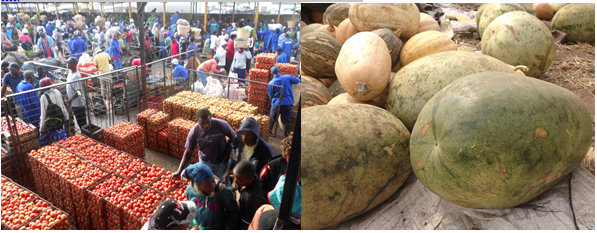In every African community you can find people who are naturally curious and those who lack interest in learning. Those who are curious can describe many aspects of their local environment such as natural resources and man-made features like water sources, dip tanks, schools, markets and business centres as well as the history of their community. Such curiosity makes them potential champions in monitoring climate change and economic drivers. Because they are interested in others, curious people can harness creativity and empathy in a world driven by all kinds of networks.
The current impetus for wholesale commercialization of African agriculture and economic development is happening at the expense of curiosity, empathy and situational intelligence. Technical knowledge is necessary but not enough without these important soft human aspects. Rather than trying to sell commodities in a hurry and go back home, farmers should spend more time explaining the value of their commodities to consumers and other actors.

Marrying curiosity with digital literacy
While cultivating digital skills is receiving most of the attention in African countries, the basic skill required to navigate the digital era is curiosity. Unfortunately this skill is not being adequately nurtured and supported in African schools where standardized curriculum is destroying curiosity. In addition, standardized communities such as those found in urban areas have little empathy for those who are different. That is why in most affluent suburbs, neighbours may live side by side for decades without knowing or talking to each other.
On the other hand, rural communities tend to have a lot of curiosity. Households in many neighbourhoods know each other in much more details. Digital literacy can make more sense in African countries if it builds on the collective curiosity and humility of rural communities. Curiosity about ideas can improve creativity and curiosity about people can improve empathy. Development workers cannot be empathetic for farmers unless they are first curious about them. Youths cannot be creative unless they are first curious to learn new ideas.
Decolonising agriculture and technology through harnessing curiosity
Instead of reproducing uneven relationships between former colonisers and the colonised, core aspects of African technology design should strive to decolonise relationships by harnessing the curiosity of the formerly colonised communities. They are not just communities but people who deserve to express their knowledge. African formal educational institutions should stop teaching, examining and interpreting technologies based on the pedagogies, languages and literacies of colonising countries. There is need to create actions that can respond to, and resist, uneven relations in technology design.
Emotional and situational intelligence in African rural communities
Emotional intelligence has remained a dominant knowledge trait in traditional African societies. There has always been various ways of teaching the young generation to become emotionally responsive and mindful towards improving performance in agriculture or any other trade. Up to this day, a critical part of emotional intelligence remains situational intelligence. In some communities, from a tender age, young people are taught the importance of situational intelligence in making people feel well taken care of. They also become aware that situational intelligence is about adapting yourself and your attitude. Unfortunately, in the modern era, young people are not prepared to do that because situational intelligence is not learned in school. Yet it is so critical in the current network economy. Farmers and traders need the intelligence to adapt themselves to consumers they engage with. They should learn to be patient and refrain from making decisions on the spot. That means they must be empathetic with people.
Every African market has its own culture that has to be understood before engaging in meaningful business of any kind. In some markets you need to start by convincing ordinary actors from the bottom and slowly move to the leadership. Once consensus is reached from the base, the necessary collective buy-in is almost guaranteed. If you fail to follow this process, you may never create sustainable relationships with the market no matter how much investment you want to bring. This knowledge is very important for financial institutions trying to work with SMEs for the first time. It is not just about availing loans but understanding salient issues at a granular level. Every market has its own slow resilience which has seen it survive turbulent times.
In some informal markets, actors need to build consensus among themselves before accepting anything from outside, no matter how sensible. There is a certain nuanced hierarchy which has to be understood and allowed to make sense of what is being proposed. You are not just moving into a vacuum as a financial institutions but getting into already existing networks and relationships. Huge doses of curiosity and empathy are certainly required in engaging such a community. Sometimes it is critical to treat traders, borrowers and consumers like they are part of your family by showing real empathy towards them. Business as usual can be retrogressive. As African countries are on the path to becoming network-dominated societies, digitisation efforts have to fully consider existing empathy, curiosity and emotional intelligence towards innovatively building resilient communities.
charles@knowledgetransafrica.com / charles@emkambo.co.zw / info@knowledgetransafrica.com
Website: www.emkambo.co.zw / www.knowledgetransafrica.com
eMkambo Call Centre: 0771 859000-5/ 0716 331140-5 / 0739 866 343-6
